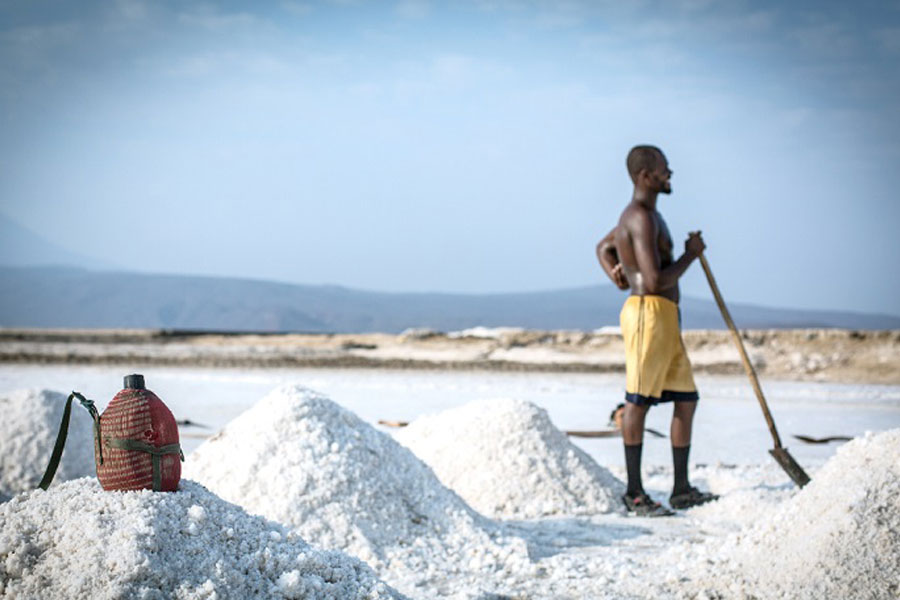
Verbatim | Nov 23,2024
May 1 , 2020
By Ephrem N. Kerego (MD)
Africa is beset with innumerable problems, putting the lives of its people in a seemingly endless struggle for survival. Political turmoil, tribal conflict, tropical diseases, the refugee crisis, drought and famine have always dominated the discourse about our continent.
The sad reality is that most of these problems are either caused or worsened by our politicians' mismanagement of resources. Our leaders’ ill-fated actions or sometimes inaction have brought us down to illiteracy, poverty and dependency. The greed, nepotism and narcissism exhibited by our leaders stretches its claws to reach every aspect of our lives. The Novel Coronavirus (COVID-19) pandemic has just exposed some of these behaviors in the health sector.
With countries across the world in some type of lockdown and air travel banned across borders, African leaders, who typically fly overseas for treatment at the slightest feeling of physical discomfort, have nowhere to go. It must be a very uncomfortable situation for these leaders. They have found themselves face to face with a healthcare system that they have long neglected.
The case of Abba Kyari, chief of staff to the Nigerian president, who died of complications from COVID-19 as a result of underlying health conditions after treatment, uncharacteristically enough in his own country, illustrates this point.
In normal times, most African leaders are known to put the comfort and wellbeing of themselves and their families before the needs of their country. It is not uncommon for these leaders to lead a lavish lifestyle, while the majority of their people toil in a desperate existence. We have witnessed leaders accumulate enormous amounts of wealth that most Western leaders can only envy.
Isabel dos Santos, the richest woman in Africa, is the daughter of Jose’ Eduardo dos Santos, who came to power in Angola with only the suit on his shoulders and left the richest leader in Africa with an estimated wealth of 20 billion dollars.
These leaders will do anything to hold onto power indefinitely. In their quest for lifelong tenure, they have to overcome natural and human-made obstacles. Looking at what they have been doing to stay on their thrones and the current standing of the healthcare provisions in Africa helps one understand the unique challenges the current pandemic presents.
From 1950 to 2000 there were 44 African leaders who lost their lives while in office. Twenty died of natural causes, 19 were assassinated or executed and five died in car or plane accidents. In order to stay in power, African leaders had to somehow avoid these mishaps. And we know that most of our leaders will do anything to hold onto power indefinitely.
So they started to import the most advanced and safest private jets, helicopters and cars. This is why in many African cities if one sees the latest model of SUV cruising in the streets, it is highly probable it has a government license plate.
African leaders are also known to have the biggest and toughest bodyguards around them. Muammar Gaddafi, former prime minister of Libya, used to walk around surrounded by 15 female bodyguards, extensively trained in martial arts. These efforts indeed paid dividends. Since the 21st century, no African leader has died in a car or plane accident. Only three have been assassinated, a substantial decrease from the previous half century.
Taking a closer look at the natural causes of death can give some insight into healthcare in most African countries, including Ethiopia. Of course, in the second half of the 20th century and in the modern era, most African leaders in power died of natural causes. But this is also telling. For a young continent where the average age is just 19 years, its leaders are the oldest.
When Mugabe was evicted from power at the age of 93, he was replaced by a 75-year-old man. This old age and persistence in power might partly explain the high rate of death in office. Bodyguards and modern vehicles will not protect them from diseases.
Why did these African leaders not invest in health, which is their number one killer while in power?
The answer is easy. It is because these leaders are not fated to use the existing healthcare services in the countries they lead. Africa loses a great deal of its foreign currency paying for the medical expenses of its leaders. Whenever they feel unwell, our leaders are flown out by chartered planes to health facilities in Asia or Europe. Since 2000, there are 13 African leaders who have died of natural causes. Seven of them died in hospitals in Europe, including our late prime minister, Meles Zenawi. The former first lady of Nigeria, Stella Obasanjo, died at a hospital in Spain in 2005 after complications from cosmetic surgery. These expenses are all taken from the pockets of poor African farmers who have to decide between feeding their children and getting treatment.
It is unfortunate that all that money is not invested at home to improve the health infrastructure and pharmaceutical industry and used to build up highly competent healthcare providers. But African leaders always have a better strategy: Get sick, fly away.
Following the pandemic, the leaders have been unable to fly as much as to their liking. Imagine our honorable ministers waiting in line to be seen by the very physicians whom they looked down on. Imagine our honorable officials having to wait in line with the commoner to get admission to precious ICU wards. Imagine our beloved governors lying on the corridors of our collapsing hospitals.
It is time for our leaders to look at themselves long and hard. This pandemic should be a good lesson to get our act together - invest heavily and amend the healthcare system. The United Kingdom's Prime Minister, Boris Johnson, was proud to have good care at the hands of NHS workers. We should work toward having a system we will have the confidence to be treated by.
In 2001, African leaders came together and passed a resolution in the Abuja Declaration to invest more in health. They pledged to allocate at least 15pc of their budget to health. After 10 years, only one country, Tanzania, has fulfilled its promise. Ethiopia still allocates well under 10pc to its health sector. Our leaders should be true to their word and ensure better healthcare for all Africans.
PUBLISHED ON
May 01,2020 [ VOL
21 , NO
1044]


Verbatim | Nov 23,2024

Viewpoints | Jun 07,2020

Advertorials | Feb 12,2024

Commentaries | Apr 17,2021

Sunday with Eden | May 23,2021

Radar | Dec 19,2018

Radar | Jun 17,2023

Fineline | Mar 09,2019

Letter To Editor | Jan 26,2019

Fortune News | Feb 07,2024

My Opinion | 131983 Views | Aug 14,2021

My Opinion | 128371 Views | Aug 21,2021

My Opinion | 126309 Views | Sep 10,2021

My Opinion | 123927 Views | Aug 07,2021

Dec 22 , 2024 . By TIZITA SHEWAFERAW
Charged with transforming colossal state-owned enterprises into modern and competitiv...

Aug 18 , 2024 . By AKSAH ITALO
Although predictable Yonas Zerihun's job in the ride-hailing service is not immune to...

Jul 28 , 2024 . By TIZITA SHEWAFERAW
Unhabitual, perhaps too many, Samuel Gebreyohannes, 38, used to occasionally enjoy a couple of beers at breakfast. However, he recently swit...

Jul 13 , 2024 . By AKSAH ITALO
Investors who rely on tractors, trucks, and field vehicles for commuting, transporting commodities, and f...

Jul 5 , 2025
Six years ago, Ethiopia was the darling of international liberal commentators. A year...

Jun 28 , 2025
Meseret Damtie, the assertive auditor general, has never been shy about naming names...

Jun 21 , 2025
A well-worn adage says, “Budget is not destiny, but it is direction.” Examining t...

Jun 14 , 2025
Yet again, the Horn of Africa is bracing for trouble. A region already frayed by wars...

Jul 6 , 2025 . By BEZAWIT HULUAGER
The federal legislature gave Prime Minister Abiy Ahmed (PhD) what he wanted: a 1.9 tr...

Jul 6 , 2025 . By YITBAREK GETACHEW
In a city rising skyward at breakneck speed, a reckoning has arrived. Authorities in...

Jul 6 , 2025 . By NAHOM AYELE
A landmark directive from the Ministry of Finance signals a paradigm shift in the cou...

Jul 6 , 2025 . By NAHOM AYELE
Awash Bank has announced plans to establish a dedicated investment banking subsidiary...